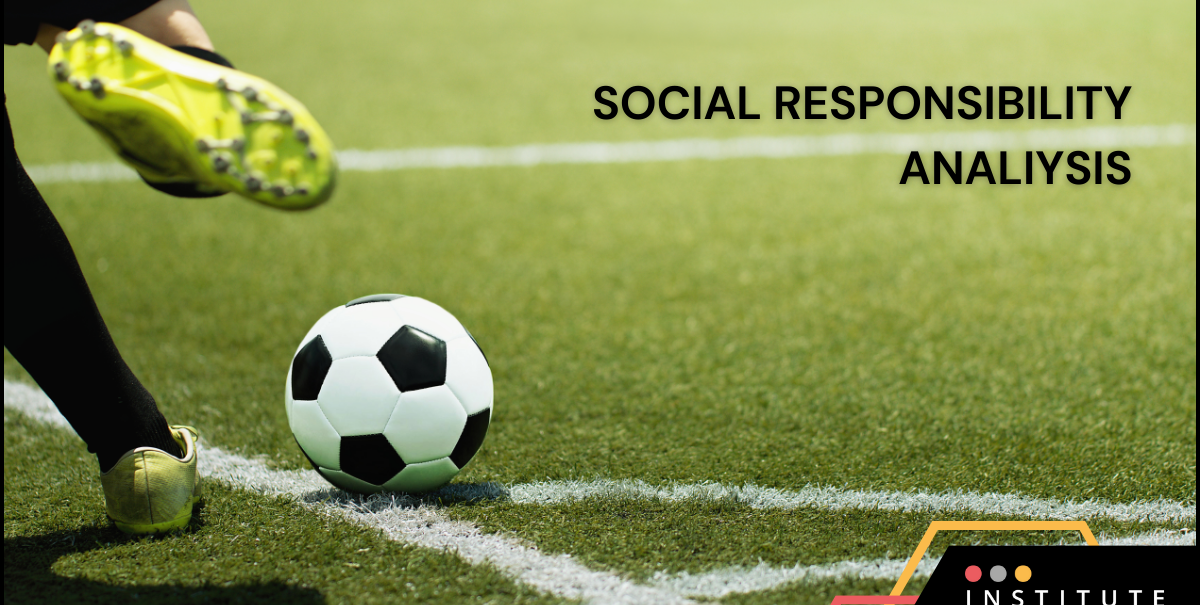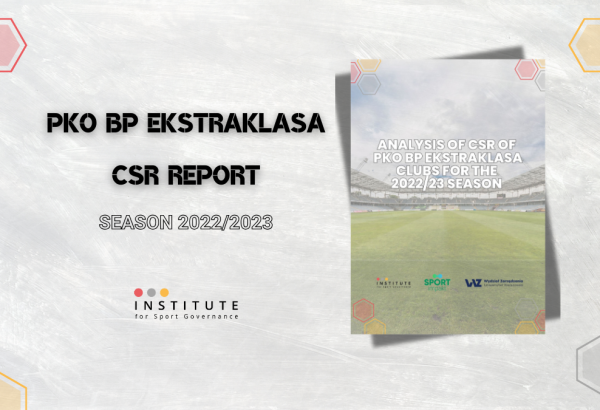Analysis of the social responsibility of PKO BP Ekstraklasa clubs for the 2022/23 season

Share:
The following article is an exempt from the full report on responsibility of PKO BP Ekstraklasa football clubs, an annual analysis conducted by the Institute for Sport Governance and Sportimpakt.
| society | environment | governance | average | |
| 2022/23 | 37% | 18% | 34% | 30% |
In the social responsibility analysis for the 2022/2023 season, PKO BP Ekstraklasa clubs received an average score of 30%. The scores in each responsibility area were: 37% in the area of society, 18% in the area of environment and 34% in the area of governance.

Changes in average ratings in social responsibility analysis at PKO BP Ekstraklasa clubs over the last six seasons
Compared to the two previous seasons, a significant improvement in performance of the PKO BP Ekstraklasa clubs is visible. In the three mentioned areas, the following can be observed: a return to the pre-pandemic scale of activities in the area of society, slow but discernible progress in the area of environment and regular progress in the area of governance, which last season was rated the highest ever.
In the area of society, clubs are most commonly involved in grassroots sport activities (e.g. sport for all programmes aimed at children and young people), using the club’s influence in their environment (e.g. to promote socially desirable behaviours and attitudes) and cooperation that is part of local development (e.g. by supporting local authority activities). Progress in relation to previous years is evident in greater involvement in the implementation of initiatives and programmes that are a part of grassroots sport, undertaking activities to counteract unacceptable behaviour and promoting socially desirable attitudes or volunteering promotion. However, activities are still sporadic in reference to promoting a healthy environment for sports events or providing information on health and safety mechanisms for children and young people in the football academies.
In the area of environment, clubs most take measures to support the use and promotion of alternative (to cars) means of transport to get to sporting events. Some progress is perceptible in the role of reducing environmental impact in the organisation’s activities, for example through effective management of natural resources (e.g. use of greywater, alternative energy sources). However, it should be stressed that most clubs are still minimally involved in environmental impact issues and the progress at the average performance level is built primarily through the work of the leader clubs.
In the area of governance, clubs stand out positively in terms of transparency of their academies and the organisations themselves, and relatively often they have a transparent ownership structure, providing basic information about, among other things, the management and supervisory board. On the other hand diversifying the composition of the management and supervisory boards (by gender) and having or referring to transparent rules of conduct for the organisation’s environment (e.g. a code of ethics) still look bad. Compared to previous years, the greatest progress can be seen in the transparency of organisations, e.g. the prevalence of publishing financial statements on the website or the presentation of information on contracts supported with public funds. This is, among other things, a consequence of the requirement to publish financial statements on the website.
| AREA OF SOCIETY | |||
| Popular manifestations | score | Unpopular manifestations | score |
| The organisation promotes grassroots sport | 61% | The organisation promotes healthy environment for sports events | 4% |
| The organisation uses the power of the sport club impact in its environment | 57% | The organisation informs about mechanisms of protection of children and youth health and safety | 13% |
| The organisation is committed to local development | 56% | The organisation promotes fair play | 15% |
| AREA OF ENVIRONMENT | |||
| The organisation supports the use of and promotes alternative means of transport to sport events | 51% | The organisation limits its environmental impact by reducing and segregating waste | 4% |
| The organisation provides education on reducing environmental impact | 13% | The organisation reduces its environmental impact through efficient management of natural resources | 9% |
| Reducing environmental impact plays a role in the organisation’s operations | 12% | ||
| AREA OF GOVERNANCE | |||
| The organisation’s academy is transparent | 68% | The organisation opts for a diverse board composition | 9% |
| The organisation is transparent | 54% | The organisation has clear rules of conduct (e.g. a code of ethics) | 11% |
| The organisation has a clear ownership, management and supervisory board structure | 44% | The organisation has a clear vision of development | 19% |
Among the PKO BP Ekstraklasa clubs, Widzew Łódź scored highest in the social responsibility analysis for the 2022/2023 season. The second place in terms of average score went to Warta Poznań and the third place to Legia Warszawa. When it comes to specific areas, the standouts were: Widzew Łódź, Legia Warszawa, Pogoń Szczecin and Cracovia Kraków in the area of society; Warta Poznań, Widzew Łódź and Legia Warszawa in the area of environment and Widzew Łódź, Miedź Legnica and Zagłębie Lubin in the area of governance.
| society | environment | governance | average | |
| Widzew Łódź | 69% | 43% | 71% | 61% |
| Warta Poznań | 31% | 51% | 43% | 42% |
| Legia Warszawa | 48% | 36% | 31% | 38% |
| Pogoń Szczecin | 47% | 27% | 26% | 33% |
| Zagłębie Lubin | 31% | 23% | 45% | 33% |
| Raków Częstochowa | 46% | 17% | 33% | 32% |
| Miedź Legnica | 42% | 0% | 51% | 31% |
| Wisła Płock | 39% | 15% | 39% | 31% |
| Śląsk Wrocław | 41% | 17% | 34% | 31% |
| Cracovia Kraków | 47% | 17% | 23% | 29% |
| Piast Gliwice | 32% | 10% | 39% | 27% |
| Stal Mielec | 36% | 0% | 43% | 26% |
| Lech Poznań | 37% | 15% | 25% | 25% |
| Górnik Zabrze | 31% | 19% | 25% | 25% |
| Lechia Gdańsk | 26% | 10% | 34% | 23% |
| Radomiak Radom | 22% | 10% | 22% | 18% |
| Jagiellonia Białystok | 26% | 5% | 19% | 17% |
| Korona Kielce | 22% | 10% | 15% | 16% |
| average | 37% | 18% | 34% | 30% |
The high ranking of Widzew Łódź is the result of a process of definining its responsibility within the club. Among other things, the organisation publishes a CSR strategy covering a wide range of activities, procedures and regulations, as well as its sports strategy with specific goals. The club focuses on the social area, cooperating with a range of partners and using their impact on the large number of people gathered around the organisation. This community also demands transparency from the club, which the organisation is increasingly committed to.
Warta Poznań is a Polish leader in strategic thinking about the environmental impact of a sport club. The club was the first sport organisation in Poland to publish an environmental policy, an ESG strategy, and is already presenting its second holistic strategy document with clear references to responsibility.
Legia Warszawa stands out above all through the activities of the Legia Foundation, whose initiatives can serve as a model of a mature view on the role of a sport club in its environment. The Foundation continues many recurring projects, and the scale of its ad hoc activities, including the ‘Ready to Help’ project, is a good illustration of the potential of this organisation in Warsaw.
The clubs of of the PKO BP Ekstraklasa that deserve a positive mention due to their progress in comparison with the previous season (2021/22) are: Wisła Płock, Piast Gliwice, Warta Poznań and Pogoń Szczecin (the biggest absolute changes at the average rating level).
The full version of the report will be published at the end of April 2024. To receive more information contact the author Pawel Zembura (pz@govsport.eu).


